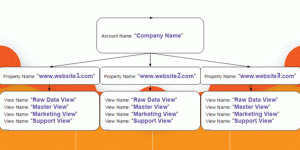Link Building Isn’t Dead: Here’s Why
For any business or individual creating a website, understanding the complexities of SEO is paramount to long-term success. You want to ensure that search engines find your site and reward your hard work and excellent content with a prime listing on page one.
Additionally, with social media sites like Facebook changing their algorithm so that links don’t show up in feeds, gaining organic search traffic is more important than ever.
But getting your content onto the first page of Google search results is much easier said than done.
As anyone who’s created a successful website will tell you, seizing that primo ranking involves catering to Google’s legendary, ever-changing algorithm . Of course, if Google told us every factor that went into their algorithm, you could easily cater your content exactly to Google’s wishes. Unfortunately, they don’t tell us all the factors.
However, we do know some of the most important ones.
In-depth, meaningful content is still (and always will be) the central driving force in your rankings.
We’ll dive into this in a bit.
However, there are a few other vital factors that play an essential role in the masses discovering your website through Google search.
One of the most critical is link building.
What Is Link Building?

Link building is generating links from other websites to your website. These links are also called “backlinks”.
Why does this matter so much to Google?
Because links from other websites serve as popularity votes, of sorts. They tell Google that the content you’ve created on your website is valuable, and worth linking to.
Google is in the business of providing valuable information to people, so if a piece of content on your site has numerous backlinks, it’s a signal to Google that it’s worth showing in search results.
This is why link building matters so much in 2018.
Frankly, it’s getting very difficult for companies to generate organic traffic from social media. And unless you have an enormous email list, you’re not going to get much of a traffic surge when you send an email blast.
If you want people to find your website, you need organic search traffic, and one of the best ways to increase organic traffic is by getting backlinks.
To put it bluntly: if you want to succeed online in 2018, you need backlinks.
While all this sounds relatively simple and straightforward, there’s a lot to understand to ensure you’re not only building links to your site, but also building them the right way. If you get the wrong kinds of links to your site, it can actually hurt your search rankings.
We’ll get into that latter point in a minute, but first, let’s explore what makes links so important.
The Basics of Link Building

The key is that it’s not just any links, but quality links.
Links from trustworthy sources.
Much like the content on your pages or the overall construction of your website, if the links from other sites to yours are sub-par, your search engine rankings will suffer.
That’s because Google runs an evaluation process on every link to determine its worthiness. A few of the leading indicators in their analysis include:
Anchor Text
Anchor text is the clickable text in a hyperlink.
This text needs to clear and to the point so that the user who clicks it will know exactly what they will get.
For a search engine, the anchor text provides both context and relevance for the linked item.
Context
Speaking of context, it’s not just the anchor text in a link that defines its value, but also the text that surrounds your link.
In other words, does your link fit naturally within the content where it appears or does it appear to be randomly stuffed in?
Also referred to as contextual relevance, the critical point here is to make sure the link not only fits well in your content but also adds value to it.
Authority
Perhaps the easiest of the main parameters to understand, you want to ensure that your links point to sites that carry with them an underlying authority (usually referred to as domain authority).
In other words, a link from The Hollywood Reporter, a widely read entertainment website and magazine, or the Huffington Post, is infinitely more powerful than John Doe’s fan blog.
The challenge with authoritative links is in attaining them. The higher the authority of a site, the higher the degree of difficulty in getting links from it.
Your aim should be to build reliable links from sites within your industry that best suit your website or business, working your way upwards as more linking opportunities become available.
Source
Similar in many ways to authority, the source of the link is also part of Google’s evaluation criteria. It makes sense too. The source of a link increases its value to the user.
If you’re running a home repair site, links from fast food web pages won’t help you much in search rankings.
Typically this isn’t an issue for businesses with a singular focus, but if you manage a site with a bit more variation in its content always ensure the link presented is relevant to that content.
Variety
It may be the spice of life, but variety can also add some tasty seasoning to your link building. This isn’t just any variety though. Google mines your pages for the diversity of your links and looks to see if they originate from different domains.
As a general rule, the more domains represented in your links, the better.
So try not to put all of your link building focus on one or two sites, and instead acquire a variety of links from a variety of sources.
Dofollow vs. Nofollow Links
There’s a bit of debate about this in the SEO world, but generally speaking, “dofollow” links are considered much more valuable than “nofollow” links.
Essentially, dofollow links tell Google to follow the path from the link to the original website, which then gives an SEO boost to the original site.
The Right (and Wrong) Way to Build Links

As much as we’d all love an effortless way to capture high-value links that translate to favorable rankings, there is only one genuinely organic approach to do so.
Creating in-depth, quality content that people actually want to link to.
As noted above, you should view links as a vote of confidence by other internet users. If your content is beneficial, people will want to link to it. The more unique and useful that content becomes, the more links you’ll receive.
Additionally, Google is increasingly putting lengthier content at the top of rankings, presumably because they contain more relevant information (and more related keywords).
There’s a bit more to it, which we’ll explain below, but link building starts with the creation of truly valuable content that will attract links.
What’s the wrong way to build links? As is turns out, there are many ways to get it wrong.
Several years ago Google released the Penguin update aimed at improving the way they determined good links from bad ones. This new method could more easily determine whether a link was natural or produced using more nefarious tactics, often referred to as black hat links.
These black hat methods can hurt your website ranking, so it’s always best to steer clear of the following:
Private Blog Networks (PBNs)
PBN’s are essentially, a series of interconnected sites that you (or someone else) owns. In the old days, link builders would produce a piece of content on their primary site, and then link to it from all the other sites in their PBN.
This used to work, but Google is now seriously opposed to this method.
In fact, if they catch you doing it, they may completely de-index your site, which means you won’t show up in ANY searches.
Exchanges
Akin to the “I’ll scratch your back, you scratch mine” scheme of trading favors, Google frowns upon the link posting equivalent.
In fact, if your site gets bogged down with more than just a couple of these, Google will penalize your site in the rankings.
Comment Sections
While they may seem an easy shortcut, you should avoid forums, feedback and comment posts. The main reason to bypass these areas is their lack of genuine authority.
Almost every comment-type backlink is a nofollow link, meaning it will do little to boost your search rankings.
Spam
Everyone hates spam, and Google hates it more than most.
When it comes to linking, Google generally considers a link spam if it has no context or lacks a meaningful reason to exist within the content or on the page where its placed.
If you’ve ever run a website, you’ve probably seen the absurd, meaningless comments that get posted and have zero relation to the content. These comments are almost always from black hat link builders.
Whitehat Link Building Strategies

Arguably the most difficult to understand, and therefore the most often overlooked SEO component, link building can indeed be a chore for the novice SEO strategist.
Thankfully, there are a few relatively simple strategies that you can employ to help your overall search rankings.
To get sites linking to yours, you’ll want to use these link building methods:
Quality Content
As noted earlier, relevant, high-value content tends to generate multiple links and references.
Yes, you’ll need to perform some influencer outreach to get noticed initially, but if your content is top notch, your external links will be too.
Since this is by far the most generally accepted (and consistently recommended) method, we’ve included a brief example of one approach you could use in promoting that content to generate excellent links:
- Assume you manage a real estate firm. You create a topic for your blog that details several up and coming neighborhoods in your market area.
- Not only do you create real insight into these areas, gained from your experience in the field, but you also back it up with meaningful statistics and data.
- You may also include additional knowledge from other authorities on the subject. Just remember to include clear citations for them and your data points.
- Beyond posting the article to your website, be sure to include your company’s social networks, like Facebook and Twitter, as part of the distribution process. If your real estate firm has a mailing list or newsletter, includes those too.
Additionally, consider creating an email outreach campaign where you reach out to key influencers in your industry and simply ask if you can share your content with them. If the content is good enough, there’s a solid chance they’ll either share it on social media or link to it from their website.
Recognize that the world is hungry for information. If you can create relevant and meaningful information, it’s much more likely to be consumed again and again.
Partnerships
As noted previously, you’ll want to avoid anything that appears to be a blatant link exchange, but strategic partnerships, especially between companies within the same industry, can prove fruitful. Just be sure the link makes sense.
For example, a contractor who completed a project for a major management firm could acquire a link from that firm’s website.
Positive Mentions
This strategy is especially advantageous for a business that has a product or service to sell and want to generate organic traffic to their website. You’ll want to find individuals specific to your industry who can either review or comment on your product.
Final Thoughts
It is no secret that link building can be a daunting endeavor. However, if your website stands any chance of achieving a high rank in Google search, it’s definitely worth the effort to understand it and to acquire those links the right way.
Always strive to produce the best content possible and to promote it at every turn. Be sure to start small and have realistic goals and targets.
No one is going to capture a significant, authority rich link overnight, especially newer websites. It takes work and strategy. So look for small wins that can help build up relevance within your target business or industry.
Finally, avoid link building promotions or promises that are too good to be true (you’ll see these things on sites like Fiverr where you get 100 “quality” links for $10). The risk is high and you’ll do far more harm to your site.
Trust your process and remember that the internet moves pretty fast these days. If you maintain a positive link building strategy, your site rankings will improve at a similar pace.
[Article Originally published on cseo.com]
(79)






